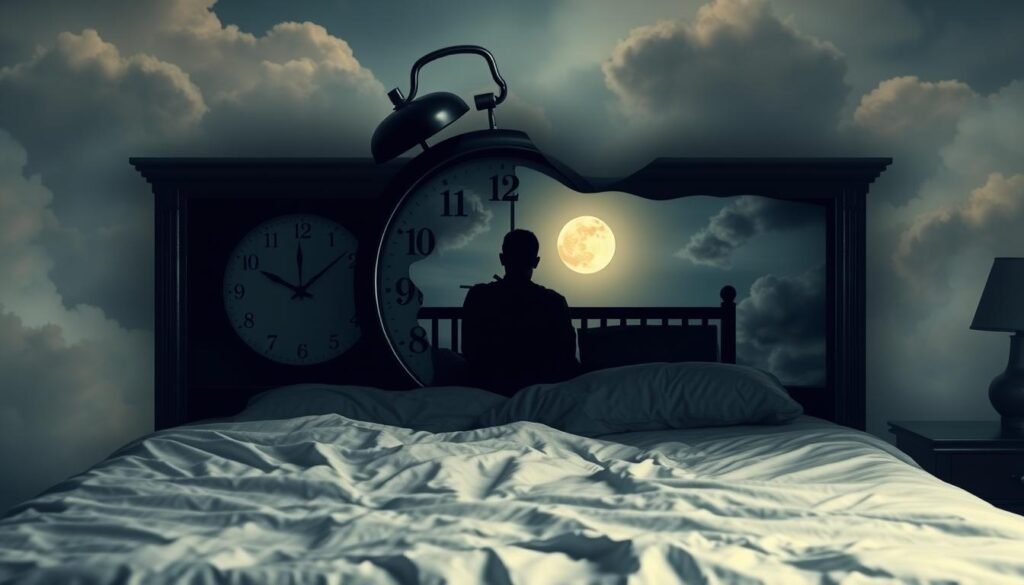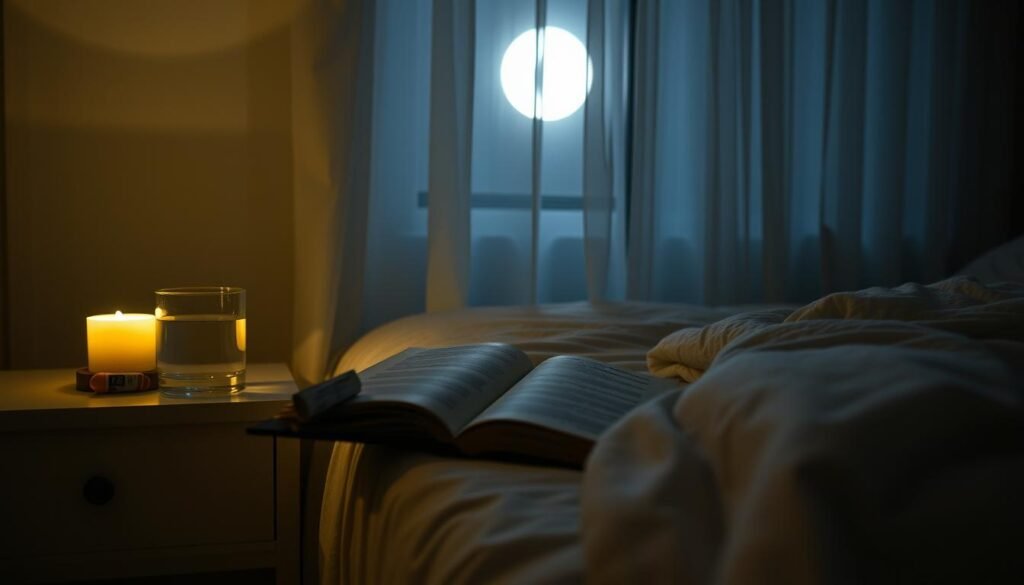Did you know about 30% of Zoloft users report trouble sleeping? This may catch you off guard if you’re looking for anxiety or depression relief. Zoloft, or sertraline, is an SSRI. It’s used to treat social anxiety, major depression, and PTSD. While effective for many, its side effects include insomnia for some. This guide will look into whether Zoloft-related insomnia fades over time. It will also cover how to get a good night’s sleep while on Zoloft.
Key Takeaways
- Zoloft is prescribed for various mental health disorders, but insomnia is a common side effect for some patients.
- While insomnia can occur upon starting Zoloft, it typically improves as the body adjusts.
- Managing insomnia while taking Zoloft may involve lifestyle changes, including sleep hygiene and exercise.
- Consulting with a healthcare provider can help in adjusting medication or addressing insomnia effectively.
- Alternative medications are available for those struggling with Zoloft-induced insomnia.
Understanding Zoloft and Its Uses
Zoloft, also known as sertraline, belongs to the SSRIs group. These antidepressants increase serotonin in the brain. This helps control mood, making Zoloft a top choice for fighting depression.
Zoloft treats many conditions. It’s used for major depressive disorder, panic attacks, OCD, PTSD, social anxiety, and PMDD. Knowing this shows how important Zoloft is in treating mental health issues.
However, some people face side effects with Zoloft. For example, about 10% of users have trouble sleeping. This issue usually lasts a few weeks to months but gets better as the body adjusts to the medicine.
SSRIs like sertraline play a key role in treating depression and anxiety. As we learn more about mental health, knowing about Zoloft’s benefits and side effects is vital for doctors and patients.
What is Zoloft?
Zoloft is a famous brand name for sertraline. It’s known for helping with mental health issues. These include problems like depression and anxiety. Zoloft definition focuses on its ability to boost serotonin levels. Serotonin is vital for mood. By increasing it, Zoloft helps ease these health issues.
Zoloft is very effective but can have side effects like insomnia. Up to 21% of people report sleep issues while on it. It’s important to know about these side effects. For those with sleep troubles, making life changes can help. Also, learning about healthy sleep habits is useful.
Insomnia as a Side Effect of Zoloft
People taking Zoloft might struggle with insomnia, affecting about 10% of them. They find it hard to fall or stay asleep, or wake up too early. This can really impact how they feel during the day, making them tired and lowering their quality of life.
Zoloft affects the brain by boosting serotonin levels. This change can mess with your natural sleep cycle. While for some, insomnia fades as their body gets used to the drug, results vary. The amount taken and how each person reacts plays a big role.
The table below shows important info on Zoloft-induced insomnia and how it impacts users:
| Aspect | Description |
|---|---|
| Frequency | Affects up to 10% of Zoloft users. |
| Duration | Typically lasts from a few weeks to a few months. |
| Common Symptoms | Difficulties falling asleep, waking up at night, and early awaking. |
| Impact on Daily Life | Increased fatigue and decreased quality of life. |
| Connection to SSRIs | SSRIs can increase the time taken to fall asleep and reduce REM sleep. |
Does Insomnia From Zoloft Go Away
Many people on Zoloft worry about how long insomnia might last. It’s key to know that zoloft insomnia duration changes a lot from one person to another. Insomnia, which includes trouble falling or staying asleep, affects up to 10% of users. This issue might persist for weeks to months.
Duration of Insomnia When Starting Zoloft
Insomnia at the start of Zoloft is usually short-lived. Symptoms often improve as your body gets used to the medication. While some may face zoloft induced insomnia duration longer, many see a change for the better. Monitoring symptoms is vital as they depend on health and dosage.
Factors Affecting Insomnia Duration
Several aspects influence how long you experience insomnia on Zoloft. These include:
- Dosage: Higher doses could cause stronger insomnia.
- Individual responses: People react to Zoloft differently, impacting sleep.
- Duration of use: Longer use might lead to adjusting and improvement in sleep.
Often, insomnia isn’t permanent for Zoloft users, as sleep quality can get better. Talking with healthcare providers is crucial for tackling ongoing sleep issues. This ensures you’re following the best treatment plan.

Common Symptoms of Zoloft-Induced Insomnia
People who take Zoloft might face sleep issues that disturb their night. They often struggle with:
- Difficulty falling asleep
- Frequent awakenings during the night
- Premature waking in the morning
This can lower the quality of sleep. It affects how alert they are in the day. It also impacts mood and mental health. Around 10% of those on Zoloft report these sleep problems.
Insomnia from Zoloft varies from person to person. Some have mild symptoms for a short time. Others deal with longer and more severe issues. The amount of Zoloft and how long it’s been taken affect sleep.
It’s helpful to watch how Zoloft changes sleep. Talking to health professionals can offer ways to manage these sleep problems better. For tips on dealing with sleep issues, check this guide.
Knowing the symptoms of Zoloft-induced insomnia is key. Being aware helps people get the right help. This ensures better care.
Managing Insomnia While Taking Zoloft
It’s important to manage insomnia when on Zoloft to feel better overall. Good sleep habits can really help improve sleep and lessen insomnia. Learning these habits can change how you feel daily.
Importance of Sleep Hygiene
For those facing insomnia with Zoloft, sleep hygiene is key. Here are some vital Zoloft insomnia tips:
- Try to sleep and wake up at the same times every day.
- Ensure your sleeping area is cool, dark, and quiet.
- Steer clear of caffeine, nicotine, and big meals before bed.
- Reduce blue light from screens before sleeping, as it affects melatonin.
- Use relaxation methods like meditation or stretching to calm your mind.
When to Contact a Healthcare Provider
Sometimes, you might need a doctor’s help with Zoloft insomnia. It’s essential to know when to contact a doctor if sleep issues don’t improve or get worse. Reasons to seek help include:
- Feeling more anxious or irritable.
- Your daily life or well-being is hugely affected.
- Being tired even after getting plenty of sleep.
- Struggling to adjust your sleep schedule despite good efforts.
Talking about these problems with a doctor might lead to changes in your treatment or new solutions.

| Symptom | Action |
|---|---|
| Persistent insomnia | Consult with a healthcare provider |
| Increased anxiety | Explore treatment adjustments |
| Impact on daily life | Discuss options with a doctor |
| Fatigue despite sleep | Seek evaluation from a professional |
| Difficulty adapting sleep schedule | Talk to a healthcare provider |
Alternative Medications to Consider
When insomnia from Zoloft becomes hard to handle, looking at other medications may help. Drugs like mirtazapine and trazodone have calming effects, which could help with sleep problems. Meanwhile, bupropion is different because it usually doesn’t cause sleep issues, making it a good alternative to Zoloft.
Some antidepressants work well and have fewer side effects. For example, Lexapro has shown to be more tolerable and effective for depression than Zoloft. Prozac is equally effective for depression and less likely to cause diarrhea. However, Effexor might raise blood pressure at high doses, which makes it less suitable for some.
| Medication | Type | Key Benefit | Side Effects |
|---|---|---|---|
| Lexapro | SSRI | Better tolerated, effective for depression | Mild nausea, sleep disturbances |
| Prozac | SSRI | Lower risk of gastrointestinal issues | Headaches, sexual dysfunction |
| Effexor | SNRI | Helpful for anxiety and depression | Increased blood pressure at high doses |
| Cymbalta | SNRI | Aids in relieving nerve pain | Fatigue, dizziness |
| Wellbutrin | Atypical Antidepressant | Associated with weight loss | Insomnia, dry mouth |
| St. John’s Wort | Herbal Supplement | Effective for mild depression | Significant drug interactions |
| SAMe | Herbal Supplement | Fewer side effects than drugs | Possible gastrointestinal upset |
Before trying these alternatives for insomnia, talking to a healthcare professional is key. Everyone responds differently to medication, based on health, side effects, and how they react to the treatment. This ensures choices are made with the best information.
Non-Pharmaceutical Remedies for Insomnia
Many people search for ways to beat insomnia without using medicine. Solutions that don’t involve drugs can work well, especially when you combine them with things that make sleep better.
Exercise and Its Impact on Sleep
Doing exercise for better sleep greatly helps with insomnia. Being active lowers anxiety and makes sleep better overall. Those who exercise regularly often enjoy deeper and more refreshing sleep. But, it’s good to skip hard workouts right before bed. They might wake you up instead of helping you relax.
- Light to moderate exercise can help you fall asleep faster and sleep longer.
- Walking, jogging, or yoga are especially good for sleep.
- Exercising regularly can help fix some sleeping issues caused by medicines like Zoloft.

Regular exercise is an easy way to fight insomnia without medicine. It improves both your mental and physical health, leading to better sleep. To fully understand how different helps work, talk to healthcare experts. You can find good advice on dealing with medicine side effects, including how to handle them.
Natural Supplements for Better Sleep
Many people look for safe ways to fight insomnia without using prescription drugs. Natural sleep supplements are a good choice for those avoiding addictive options. Melatonin is a popular natural sleep aid. It’s known as the sleep hormone and can help adjust our body’s clock, aiding in falling asleep easier.
While melatonin is safe for short use, some might have side effects or it could affect other medications. It’s important to talk to a doctor before taking melatonin or other sleep aids if you’re on medications like Zoloft.
Another option is 5-HTP, which might boost mood and sleep. Studies show 5-HTP could help people with mild depression, improving their sleep and mood. But, like melatonin, it’s important to know about possible side effects, especially if you’re taking antidepressants.
To wrap up, natural sleep aids like melatonin and 5-HTP can be helpful. But always seek professional advice first. This ensures safe use and can lead to better, more restful sleep.
Conclusion
Many people taking Zoloft experience insomnia as a side effect, happening to around 20% of users. However, this often gets better as the body gets used to the drug. It’s important for patients to practice good sleep habits and talk openly with their doctors.
If you’re worried about insomnia from Zoloft, it usually gets better. This is because Zoloft helps with depression and anxiety, which can make it hard to sleep. Looking into other treatments or natural solutions can also help sleep quality.
With the right approach, you can manage insomnia while still getting the benefits of Zoloft. This leads to improved mental health and lifestyle.